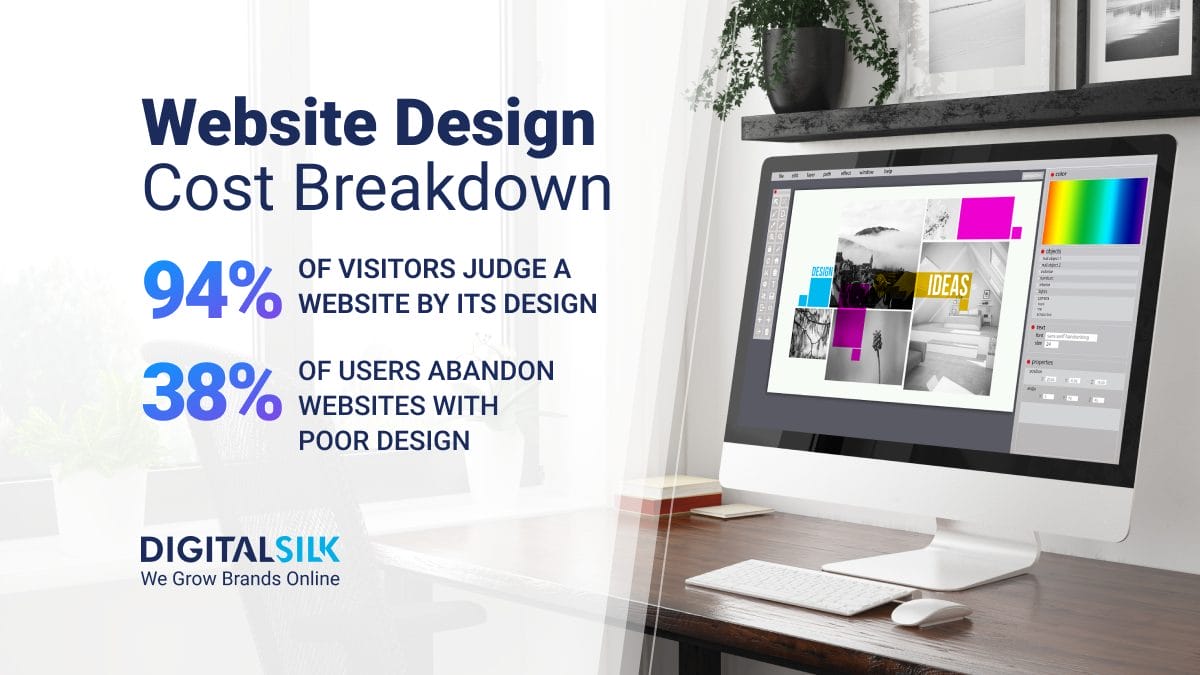Did you know that 50% of consumers consider a company’s website design crucial to their opinion of that brand?
In a world where the online presence can make or break a business, a website serves as more than just a virtual storefront — it’s a window into the brand’s story, values and offerings.
In 2024, this connection between web design and business credibility has never been stronger, especially for small businesses striving to make their mark.
Your online space becomes a canvas where you can showcase your uniqueness, and the design of your small business website acts as the paintbrush you wield to craft an impactful narrative.
In this article, we will take a closer look at 10 exceptional examples of inspiring small business websites that have mastered the art of weaving creativity and functionality. These virtual gems don’t just deliver products and services — they deliver experiences.
Small Business Websites: The Crucial Factors That Drive Success
When it comes to small business websites, a select few have managed to stand out from the crowd by embodying a set of exceptional qualities that set them apart. These qualities include:
- User-centric design: Small business websites that prioritize the user experience tend to be the most successful ones. They feature intuitive navigation, clear information hierarchy and responsive layouts that ensure a seamless browsing experience across various devices.
- Compelling visuals: Visual content plays a crucial role in engaging visitors. Successful small business websites use high-quality images, videos and graphics that resonate with their brand identity and message.
- Clear branding: A strong brand identity is reflected in every aspect of the website. Great small business websites maintain consistent use of logos, colors and typography, creating a cohesive and memorable brand image that leaves a lasting impression on visitors.
- Engaging content: Content is king, and high-quality small business websites understand this. They feature well-crafted and relevant content that addresses the needs and interests of their target audience. This can include informative blog posts, engaging storytelling and compelling product descriptions.
- Interactive elements: To engage visitors and keep them exploring, small business websites should employ interactive features. These can include interactive forms, quizzes, animations and interactive product displays that create an immersive experience.
- Effective calls to action (CTAs): To drive conversions, it’s essential to use clear and enticing CTAs. Well-crafted CTAs use persuasive language to guide visitors toward desired actions, whether it’s making a purchase, signing up for a newsletter or contacting the business.
- Social proof: Building trust is crucial for small businesses, which is why their websites should incorporate social proof elements such as customer reviews, testimonials and case studies. This can help establish their credibility and encourage potential customers to choose their products or services.
- Fast loading speed: Loading speed takes center stage in today’s fast-paced digital landscape. As the page load time extends from one to three seconds, the likelihood of a bounce rises by 32%.
- Mobile optimization: With the rise of mobile browsing, it is essential for small business websites to adapt seamlessly to various screen sizes and devices. Mobile-friendly layouts and responsive elements guarantee a consistent and enjoyable experience for users on smartphones and tablets.
All these qualities transform a small business website into a dynamic tool that not only reflects the essence of the business but also resonates with visitors on a personal level, fostering connections and driving engagement.
Let’s check out 10 examples of websites that use these qualities to drive their business results.
10 Small Business Websites To Get Inspired By
Small businesses across industries have harnessed the power of exceptional web design to create inspiring online platforms that truly stand out.
We’ve talked with our web design experts in Miami and New York City and identified 10 remarkable examples of small business websites that demonstrate the fusion of functionality, creativity, and credibility:
1. Bowery
Built with WordPress
Bowery’s website offers a refreshing digital journey, effectively communicating the company’s urban farming mission. It excels in educating and informing users about their products while guiding them through their core mission statements.
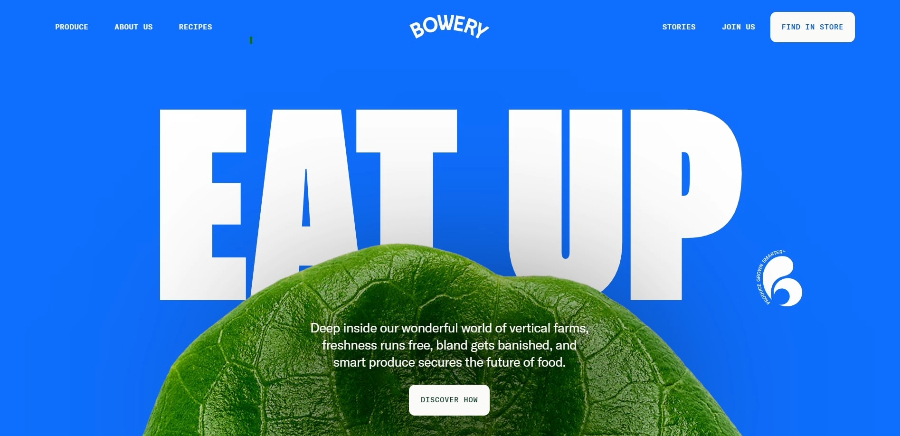
Upon entering the homepage, visitors are greeted with crisp imagery of verdant leaves, evoking an organic and invigorating aesthetic. Effective CTA buttons and motion graphics add a touch of interactivity that engages and delights.
The website has ample white space (unmarked, blank areas around and between design elements in a layout), allowing for easy navigation and clear information presentation. As users scroll down, they encounter additional product details presented in a clean, streamlined manner.
2. Qyrus
Built with WordPress
Qyrus’ website boasts a modern and sleek design that exudes professionalism and sophistication. The color palette, dominated by shades of blue, white and green, creates a clean and polished appearance.
The use of ample white space ensures a clutter-free layout, allowing key elements to breathe and catch the visitor’s attention.

The homepage features a hero banner with a captivating video that immediately draws users in. As you scroll down, the design maintains its elegance and simplicity.
The content is well-structured into sections, each with its own distinct background and a consistent style that enhances visual coherence. The typography is clean and easily readable, contributing to the overall professional look.
Clear headings and concise copy allow users to quickly grasp the company’s offerings and value proposition. CTA buttons are strategically placed throughout the website, standing out due to their contrasting color.
3. Wolfpack
Built with Shopify
Wolfpack is a London-based craft brewery. Founded by former professional rugby players, Wolfpack’s brand’s identity is deeply intertwined with rugby and its values, reflected in its visuals, messaging and overall ethos.
The website’s single-page design and intuitive navigation enable visitors to quickly find what they’re looking for, ensuring a pleasant user journey.
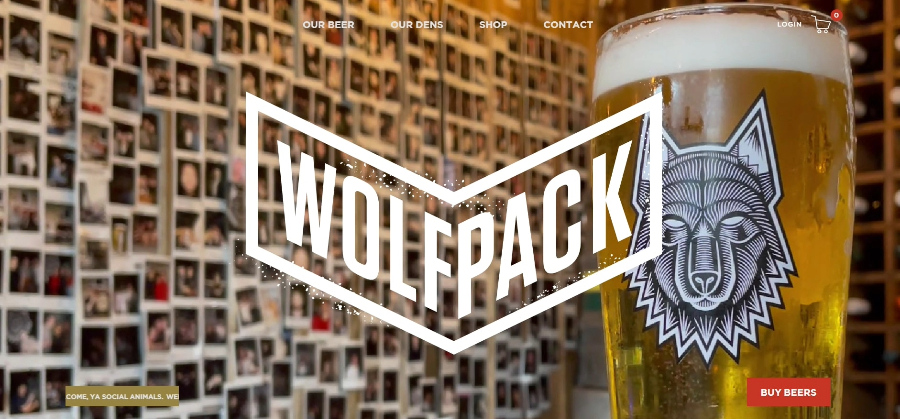
Dynamic visual elements, grunge effects, and micro-interactions maintain user engagement as they scroll down. The website’s color palette, inspired by rugby culture, successfully blends modern aesthetics with tradition.
Wolfpack’s copy is both concise and playful, effectively engaging users with rugby slang. Furthermore, the strategic utilization of negative space accentuates key elements and CTAs, enhancing the overall user experience.
4. Ception
Built with Wix
Ception is a tech-driven brand revolutionizing vehicle navigation. Its one-page website echoes this mission through strategic visuals and explanatory copy.
Ception’s website is a marvel of modern design, blending elegance with innovation. The floating navigation bar enables effortless navigation, while a parallax background adds depth.
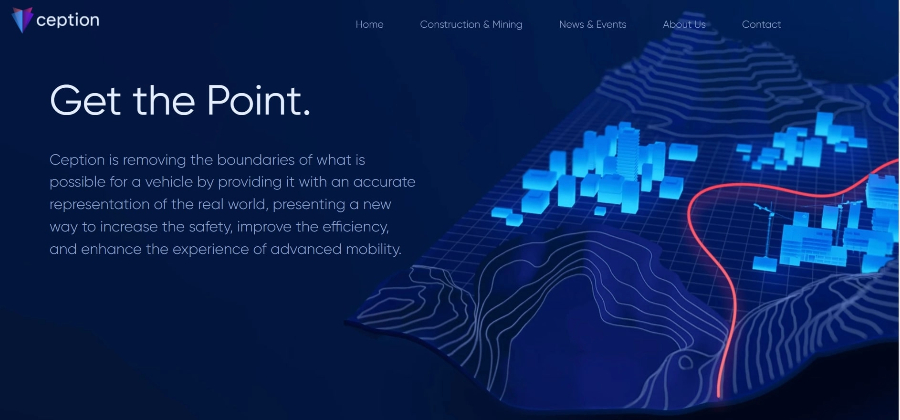
Ception’s brand identity shines through a cohesive color palette and visuals that highlight the company’s advanced solutions.
Clear hierarchy is achieved with large headers and bold, effective CTA buttons, further directing users toward essential actions.
5. Piboco
Built with WordPress
Piboco is a children’s digital library offering interactive books with hand-drawn illustrations and music. Its website design blends whimsical animations and vibrant cover art, inviting users into a next-level storytelling experience.
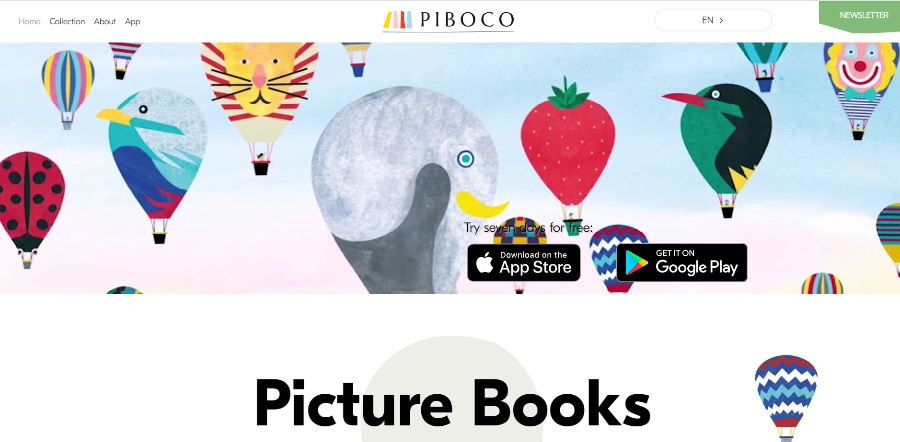
Piboco’s homepage is infused with a sense of playfulness, incorporating whimsical shapes that set the stage for exploration. Concise yet engaging copy captivates visitors, offering a glimpse into the imaginative wonders that await within the digital library.
The header ensures effortless navigation, featuring a simple website menu and a clickable logo that directs users back to the homepage. Additionally, a language toggle facilitates smooth transitions between the six languages of this multilingual website.
The mobile version replicates the engaging desktop experience, complete with animations and a welcoming screen.
6. Sonos
Built with the Salesforce Commerce Cloud platform
Sonos is a company that specializes in designing and manufacturing wireless audio products. As visitors enter their website, they’re immediately greeted by an engaging video showcasing their products.
The video effectively encapsulates the brand’s commitment to innovation and high-quality audio solutions, inviting users to explore further. As they scroll down, users are seamlessly guided through a journey that emphasizes the fusion of cutting-edge technology with exceptional design.
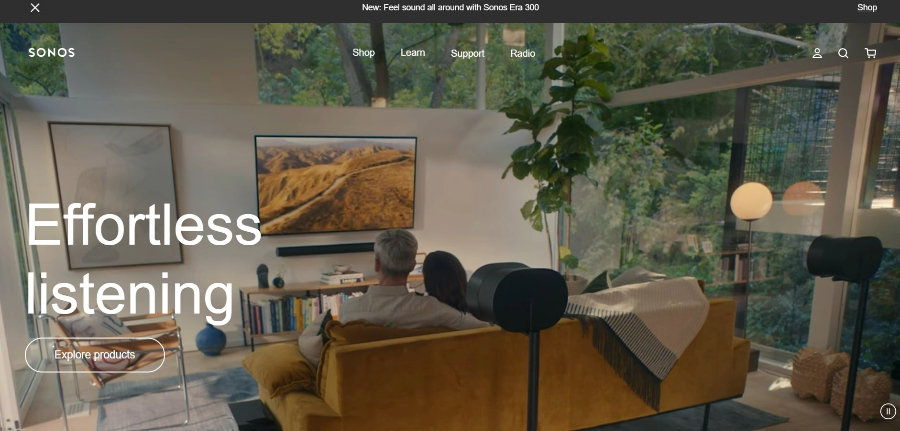
The website employs clear messaging, maintains consistent branding and employs bold imagery, resulting in an enhanced user experience. Videos play automatically., while motion graphics and animations guide users seamlessly through product pages and the streaming music section.
The product page showcases each item with detailed descriptions and high-resolution images, enabling users to make informed decisions about their audio solutions.
Sonos’ website boasts effective CTAs and offers quick assistance and guidance through the Support and Learn sections.
7. Magic Spoon
Built with Shopify
Magic Spoon has transformed the world of breakfast cereal by introducing a high-protein, low-carb, grain-free and keto-friendly option. The company’s website is an interactive whimsical wonderland, evoking both nostalgia and enchantment.

The website’s design features a vibrant and energizing color palette while the homepage prominently showcases customer reviews, providing valuable social proof of its quality and effectiveness. Additionally, strategically placed and creatively designed CTAs catch the visitor’s attention, guiding them seamlessly toward desired actions.
8. KeyNest
Built with Squarespace
KeyNest, a startup specializing in rental property services, boasts a website that marries elegance with functionality. Despite its apparent simplicity, every aspect of the design is meticulously curated to communicate its unique selling proposition — a secure key exchange system for property rental companies and Airbnb hosts.
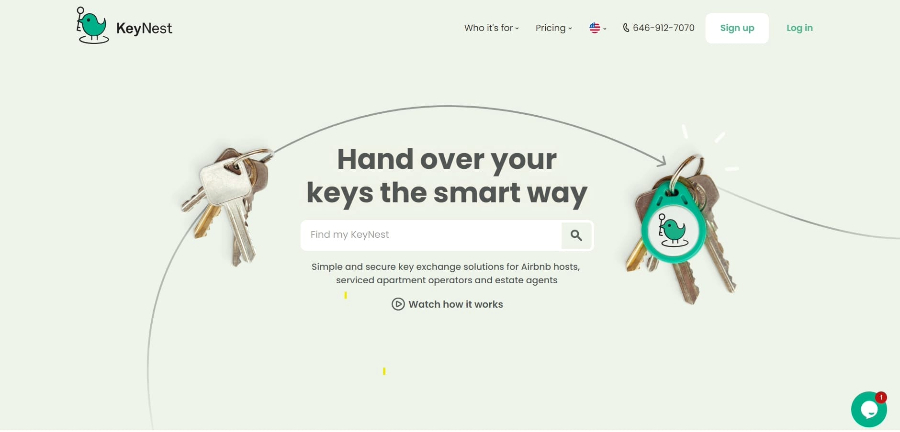
The website’s layout provides a smooth journey toward taking action, guiding visitors with strategically placed CTAs for easy access to important information. Intentional minimalism eliminates distractions while maintaining essential elements for an informative and visually pleasing experience.
KeyNest’s chatbot stands out as a notable feature, gently guiding users toward a knowledge base for common queries while providing direct communication with the customer service team. This smart balance between automation and personalized assistance enhances user engagement.
9. Casa Mami
Built with Squarespace
Casa Mami is a wonderful desert getaway, spreading over five acres. It is an ideal destination for relaxation, events and creative endeavors.
This website stands out for its captivating simplicity and bold design choices. The header features a stunning image slider, showcasing the property and location through visuals alone. This unique approach eliminates distractions, offering an immersive experience.
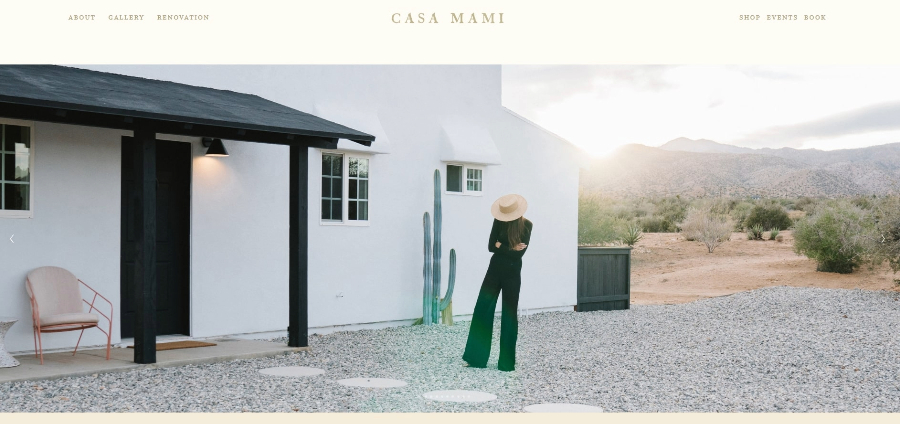
The renovation page showcases before-and-after sliders, providing a visual glimpse into the transformation process. The website’s text is presented in a smaller font size, allowing the images to take center stage.
Casa Mami’s website features ample white space and incorporates a parallax image effect, along with a prominent CTA button that redirects users to Airbnb for bookings.
10. Fat Cat Creamery
Built with WordPress
Fat Cat Creamery’s website design seamlessly blends the worlds of cats and ice cream, creating a fun and engaging online experience. Each illustration radiates a sugary charm, from the cat drawings to the delightful ice-cream icons scattered throughout the website.
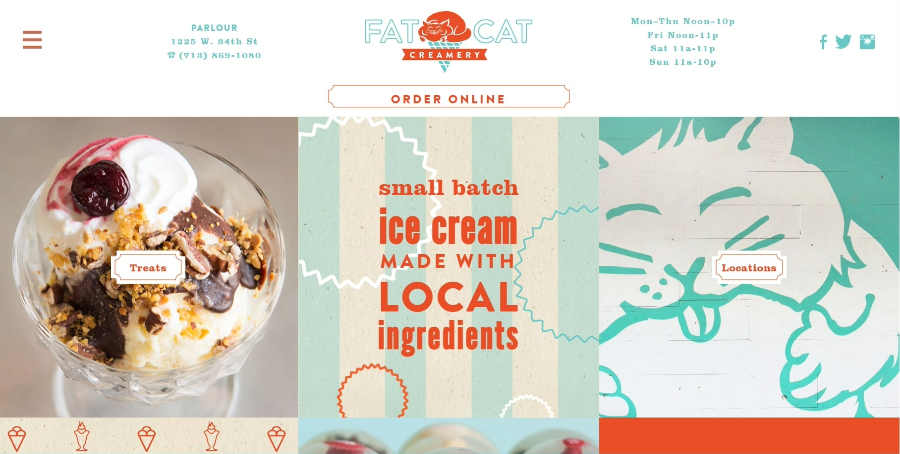
Upon landing on the homepage, visitors encounter engaging content blocks and images that serve as enticing alternatives to the traditional menu. A simple click opens doors to deeper insights into the world of Fat Cat Creamery.
The use of soft colors, meticulously captured product photos and interactive elements also contributes to an overall atmosphere that immerses visitors in an inviting online environment.
Staying true to the cat theme, the clever copy and imaginative ice cream names playfully remind visitors that in this ice cream shop, the kitty reigns supreme.
5 Best Platforms For Small Business Websites
After delving into the intricacies of the best designs, it’s equally important to address the backbone of any website’s online presence: website platforms.
When it comes to choosing the best platform for your small business website, these are the options that stand out:
- Squarespace
- WordPress
- Shopify
- Wix
- Weebly
Let’s explore these web platforms in more detail.
1. Squarespace
Squarespace is a versatile website-building platform that offers tools and features for creating professional-looking websites, online stores, portfolios, and blogs. What sets Squarespace apart is its remarkable harmony between aesthetics and practicality.
The platform boasts an array of captivating templates, each catering to distinct industries and ensuring that the website’s design perfectly reflects the brand’s identity. The intuitive drag-and-drop editor allows users to effortlessly customize layouts, images and text.
For small businesses engaged in eCommerce, Squarespace extends its appeal with integrated online stores and secure payment processing. This seamless integration facilitates marketing and selling products or services online.
Recognizing the importance of content engagement, Squarespace features built-in blogging tools. These tools facilitate the sharing of insights, updates and stories with visitors, fostering a sense of a deeper connection and interaction.
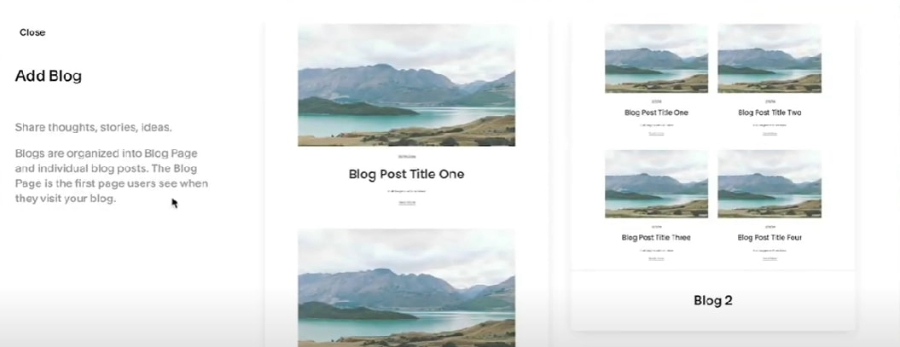
Furthermore, this platform makes monitoring web performance and enhancing visibility effortless through integrated analytics and SEO tools.
Committed to delivering an exceptional user experience, Squarespace ensures cross-device compatibility. With automatic mobile responsiveness, websites crafted with Squarespace maintain their functionality, regardless of the screen size they are viewed on.
2. WordPress
WordPress caters to a wide range of needs, making it a favorite among businesses of all sizes. This platform stands out due to its exceptional flexibility, enabling users to shape their websites according to their unique vision.
Boasting a vast library of themes and plugins, WordPress offers an abundance of design and functionality options. This feature allows users to select templates suited to their industry and customize them to a tee.
Even though WordPress might require a bit more technical proficiency than some other platforms, its learning curve is well worth the creative freedom it provides.
The platform’s powerful eCommerce plugins, such as WooCommerce, can turn any website into a fully-fledged online store, equipped with features like inventory management, payment gateways and tools for engaging with customers.
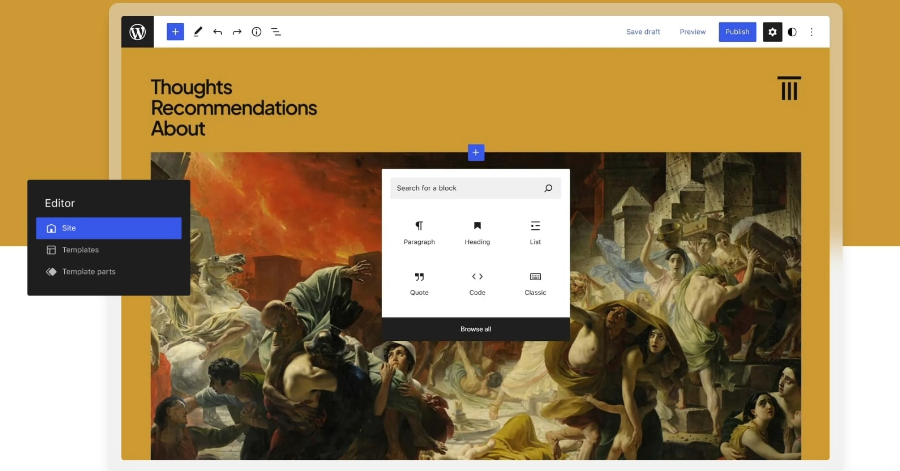
Another thing WordPress shines in is content engagement. Its built-in blogging capabilities make it easy to share insights, industry news and stories.
Plus, the platform’s SEO-friendly structure and a multitude of SEO plugins simplify the process of optimizing content for search engines and boosting the website’s visibility.
3. Shopify
Shopify is a comprehensive eCommerce platform that caters to businesses of all sizes, from startups to established enterprises. Renowned for its user-friendly approach, Shopify offers an intuitive interface that allows users to create and manage online stores without extensive technical expertise.
From product showcasing to inventory management and secure payment processing, this platform streamlines every aspect of selling online. Its extensive array of professionally designed templates allows small businesses to create visually appealing and responsive online stores that align with their brand identity.
Furthermore, Shopify’s robust app store provides additional tools to enhance the functionality and customization of online stores, whether it’s incorporating customer reviews, setting up abandoned cart recovery or implementing loyalty programs.

Apart from eCommerce essentials, Shopify also prioritizes the mobile shopping experience. In an era where mobile devices play a pivotal role in online interactions, Shopify ensures that online stores are optimized for various screen sizes and devices.
4. Wix
Wix is another popular platform for creating small business websites, offering a user-friendly interface and a wide range of customizable templates. With its drag-and-drop editor, Wix allows users to easily design and modify their websites — no coding skills required.
One standout feature of Wix is its Artificial Design Intelligence (ADI), which assists users in creating a personalized website based on their preferences and needs. This can be particularly helpful for small business owners who may not have a clear design vision.
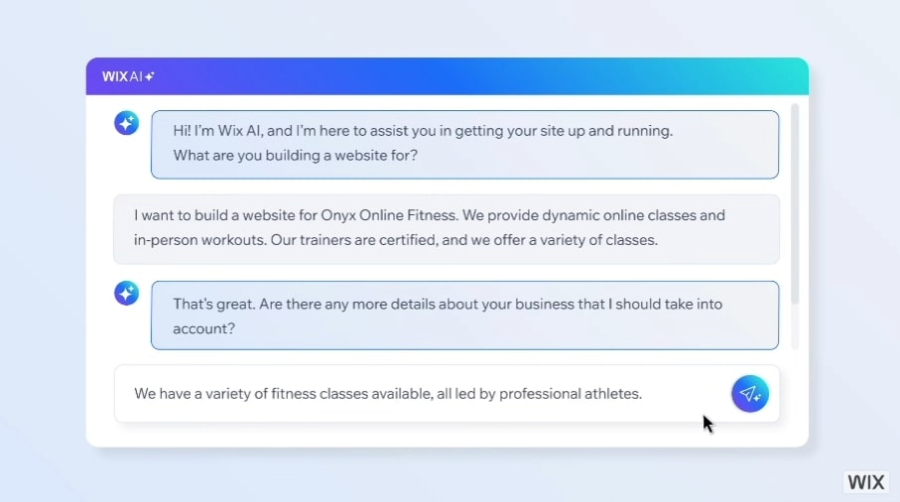
Moreover, the platform’s App Market offers additional tools and integrations to enhance functionality, such as appointment scheduling, contact forms and social media integration.
Wix also prioritizes mobile responsiveness, ensuring that websites look and function well on smartphones and tablets. In terms of SEO, the platform offers tools and guides to help users optimize their websites for search engines.
5. Weebly
Weebly is another noteworthy platform that caters to small businesses seeking an online presence.
At the heart of Weebly’s appeal is its drag-and-drop builder, which simplifies the process of designing and customizing websites. This feature allows users to arrange elements, add content and modify layouts with ease.
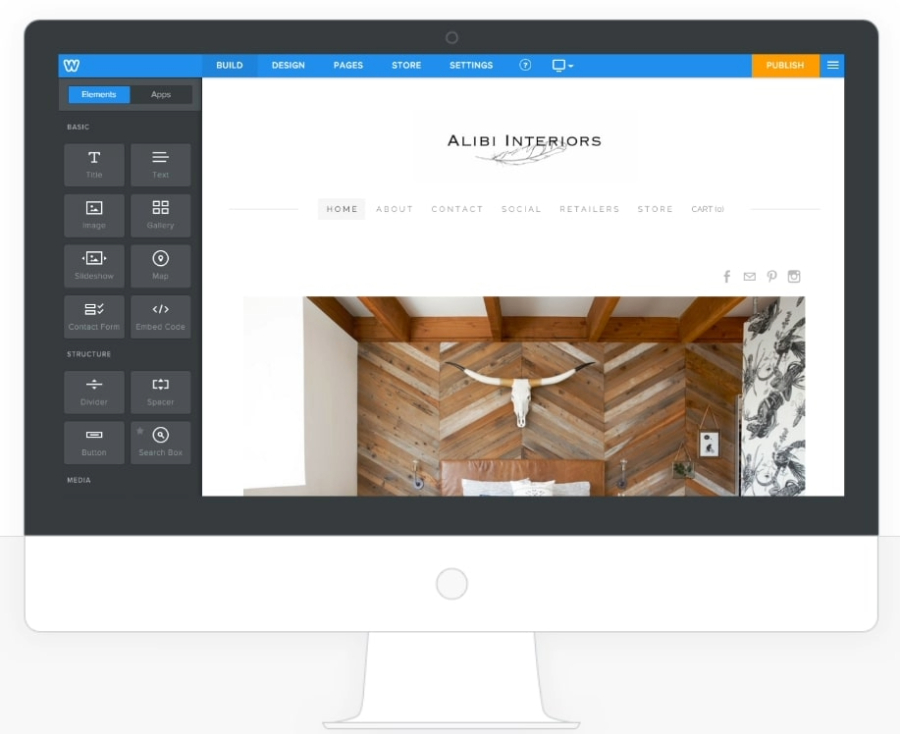
Weebly offers a variety of templates, ensuring that users can find designs that suit their industry and brand identity. While the template customization options might not be as extensive as some other platforms, Weebly’s straightforward approach makes it a great choice for those looking for simplicity and efficiency.
In terms of eCommerce, Weebly provides integrated online store capabilities, allowing businesses to showcase and sell their products or services online. The platform offers features such as inventory management, secure payment processing and customizable product pages.
While its SEO features might not be as robust as those of other platforms, Weebly still provides tools and guidance for users to improve their website’s visibility in search engine results.
Design A Custom Website For Your Small Business With Digital Silk
Your website is often the first impression potential customers have of your brand, making it a crucial tool for attracting, engaging and converting visitors into loyal clients.
Designing a custom small business website with Digital Silk ensures that your brand’s online presence is not just a placeholder, but a captivating and functional digital asset.
Digital Silk is a leading digital agency that specializes in creating custom websites that stand out in the crowded online landscape. Our seasoned designers, developers and strategists are committed to helping small businesses elevate their online presence through innovative and tailored web solutions.
Whether you’re starting from scratch or looking to revamp your existing website, Digital Silk offers a comprehensive suite of services designed to meet your specific needs. Besides web design, we offer branding, web development, digital marketing and mobile app development services.
Small Business Websites FAQs
How much does a small business website cost?
The cost of a small business website can vary widely based on several factors, including the complexity of design, the number of pages, the features and functionalities you require, and the level of customization.
A simple informational website with a few pages, for example, will cost less than a more complex eCommerce website with integrated payment gateways and advanced functionalities.
How does a custom website contribute to enhancing my brand’s digital presence?
A custom website plays a significant role in boosting your brand’s online presence in several ways:
- Uniqueness: A custom website is tailored to reflect your brand’s personality, values and offerings. This uniqueness sets you apart from competitors and makes your brand memorable to visitors.
- User experience: A custom website allows you to design and optimize the user experience according to your brand’s objectives and your target audience’s preferences. You have complete control over the layout, navigation, and overall design elements, ensuring that visitors have a seamless and engaging experience while interacting with your brand online.
- Responsive design: A custom website can be designed to work smoothly across all devices. This ensures a consistent and user-friendly experience, regardless of the device being used.
- Scalability: As your brand grows, your custom website can be expanded and adapted to accommodate new features, products or services. As a result, this flexibility will support your brand’s evolving needs.
- Credibility: A well-designed custom website establishes credibility. It shows that your brand is committed to providing a quality online experience, which can lead to increased customer trust and loyalty.
How long does it take to design and develop a custom small business website?
The time to design and develop a custom small business website varies based on factors like complexity, features, content availability and team responsiveness.
Here’s a rough breakdown:
- Planning and discovery: 1–2 weeks
- Design and mockup: 2–4 weeks
- Development: 4–8 weeks
- Content integration: 2–4 weeks
- Testing and quality assurance: 2–4 weeks
- Revisions and iterations: 1–2 weeks
- Launch: 1 week
Factors such as project size and effective communication influence the timeline as well. It’s best to collaborate with your development team for a tailored estimate.
"*" indicates required fields





